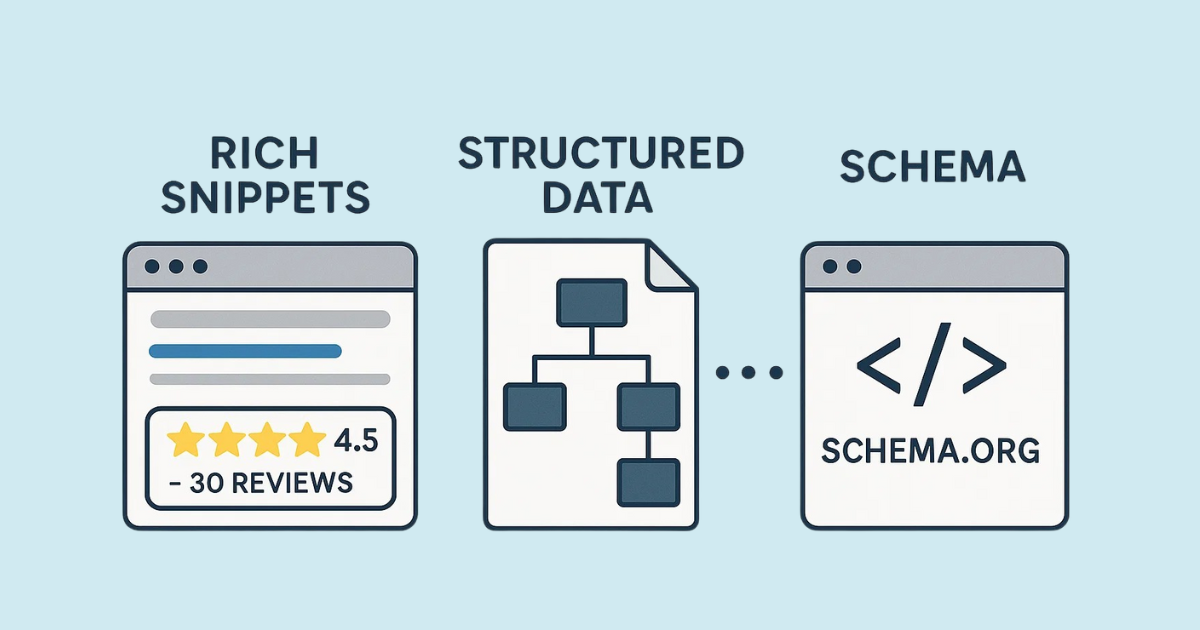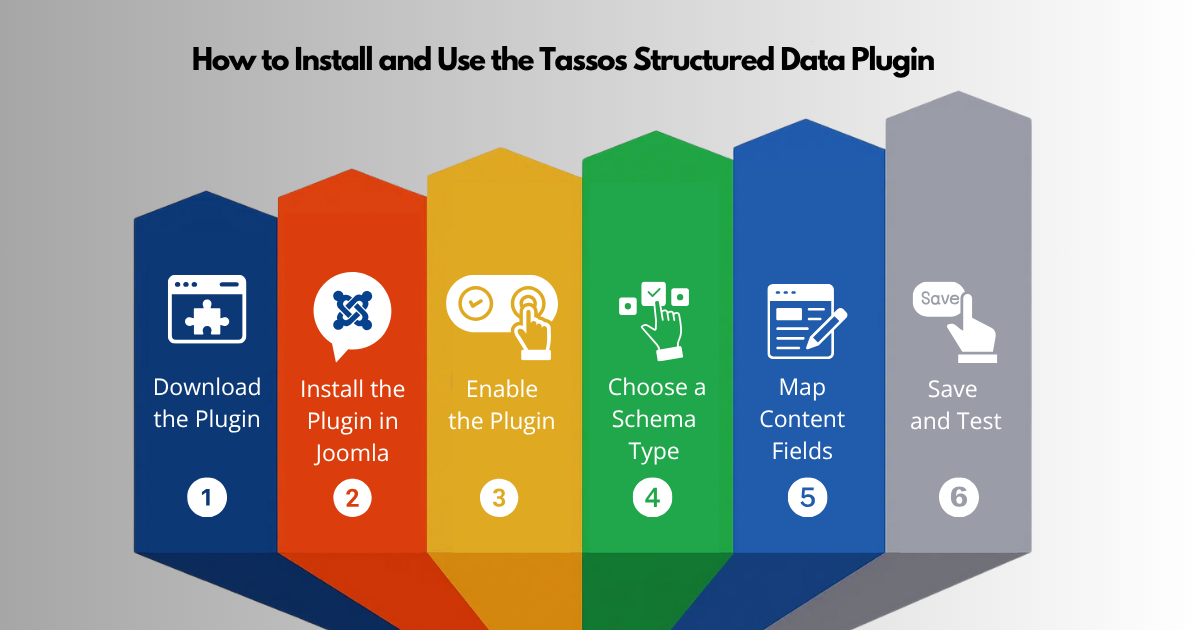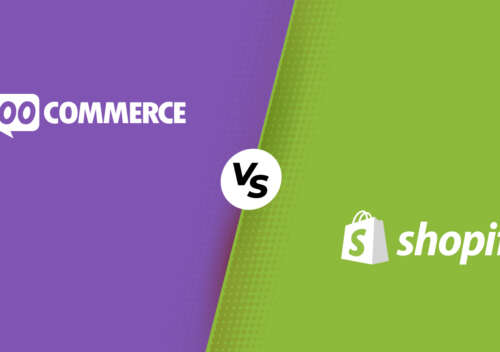As today’s digital world changes rapidly, Joomla remains a reliable and flexible content management system. What keeps Joomla going is regular updates, smarter tools, and a strong community that knows how to adapt.
Tech moves fast. Missing out on one small update today could mean losing ground tomorrow. That’s why Joomla 5 matters. It introduces new ways to manage Joomla structured data and Schema, making things easier and more powerful for both developers and content teams.
If you’ve ever wondered how to stand out in search results or make your content clearer for users, now’s the time. This blog will examine how rich snippets, smart markup, and Joomla web experience upgrades change how sites communicate with people as well as with search engines.
Rich Snippets, Structured Data, and Schema: What They Are and Why Do They Matter?
Getting listed on Google in today’s competitive digital market is not enough; you have to stand out from the rest; you need to make your listing look great. Rich snippets help you do that. Search results can be enhanced to display extra details like star ratings, event dates, product pricing, and FAQs that are directly pulled from your site’s structured data. Rich snippets can display not just the name of an event, but also its location, date, organiser, and ticket information.
As of the 2025 statistics, listings with rich snippets received up to 30% more clicks than standard listings. Joomla 5 allows this natively and the tools are built into the system to convert normal results into rich clickable experiences.

Rich snippets, however, don’t appear by themselves, they’re powered by structured data. Structured data helps search engines understand what they’re looking at by adding context to your content. For labeling and describing your content behind the scenes, it uses formats like JSON-LD, the most future-proof and Google-recommended format by 2025.
Think of it as a way-finding tool for search engines, enabling easier understanding, indexing, and display to a targeted audience. Joomla 5 manages all this automatically; no coding is required.
Structured data is built around a concept known as Schema. This is the vocabulary used by websites to describe their content in a language search engines can understand. Powered by Schema.org, Joomla 5 supports a wide range of schema types, including Articles, Products, Events, FAQs, Local Businesses, and more.
The right schema marks your content as authoritative, so Google and others will return better, more accurate results. And with Joomla, using schema isn’t a developer’s job, but can be done quickly and easily by anyone.
Different Schema Types in Joomla
Schema types are predefined content formats described by Schema.org; Joomla 5 supports these standards, allowing you to add semantic meaning to your content without manual coding. Some of the most useful types of schema are as follows:
- Article: Great for blogs and news sites, it can help your articles show in top stories or as featured snippets.
- Product: Shows important e-commerce information like price, availability, and rating.
- FAQ: Shows question-and-answer pairs right in search results – allows use for service pages or support hubs.
- How-to: Guides that walk users through a process, are great for tutorials, instructions, or visual steps.
- Event: Lists time, venue, and ticket details, great for concerts, webinars, or conferences.
- Local Business: Shares essential business info such as location, hours, contact, and service area.
- Video: Helps your videos show with thumbnails, descriptions, and durations on Google Search or Discover.
- Organisation/Person: Useful for sharing background details about your brand or team members.
- Review/Rating: This enables you to highlight critical or customer feedback directly in search results.
Using the right schema for your content type makes your site easier for search engines to index, and provides clear information to users at first look.
Implementing Schema in Joomla Using the Tassos Structured Data Plugin
Adding schema markup to Joomla is easy with the help of the Structured Data plugin like Tassos. This plugin is beginner-friendly, works seamlessly with Joomla 4 and Joomla 5, and supports a variety of schema types such as Article, Product, Local Business, FAQ, and Event.
Instead of manually writing JSON-LD, it gives you a visual interface to map your Joomla content to Schema.org types, no coding required.
With Tassos, any user (even non-technical) can start utilising schema functionality within minutes! It’s a great option for agencies, content teams, or solo developers looking to push their Joomla websites to top results in search, including rich snippets, voice readiness, and AI discoverability!
How to Install and Use the Tassos Structured Data Plugin:

Mentioned below are the steps below to use the plugin:
1) Download the Plugin
First, you need to go to www.tassos.gr and purchase or download the plugin. The plugin has both free and pro versions, so which one you choose will depend on your business needs.
2) Install the Plugin in Joomla
Once that is done, log into your Joomla administrator panel. Go to Extensions -> Manage -> Install, go ahead and upload the plugin .zip file, and click Install to get started!
3) Enable the Plugin
Once the installation has been completed, go to Extensions -> Plugins, search for Google Structured Data, and check that it is enabled. This activates it on your site.
4) Choose a Schema Type
Now, you need to navigate to the plugin’s dashboard and click New Item; select a new integration from the plugin’s dashboard; for example, Article, Product, or Event.
5) Map Content Fields
Select which Joomla article, product, or event should be tagged. Then fill in all the schema fields like title, image, author, or event date using dropdowns and the form inputs provided by the plugin.
6) Save and Test
Once you have mapped it and made any necessary changes, save it. You can then verify that your structured data is working the way you want it to using Google’s Rich Results Test or Schema Markup Validator. This will tell you if your schema is valid and eligible for rich snippets.
Common Features of Joomla Schema Plugin
With Joomla structured data, search engines understand the content on your website better. It won’t change the way your pages look to users, but it lets Google know exactly what each section means, including products, events, reviews, and articles.
Joomla 4 and Joomla 5 include built-in features to support structured data. It has never been this easy to improve your site without getting involved in complex coding. You don’t need to be a developer to begin adding structured markup; it can be done in a few clicks.
If you’d prefer to have a more streamlined experience, you can simply install a trusted Joomla structured data plugin. You can find many structured data plugins here but one of the more popular and sufficient plugins comes from Tassos, Google Structured Data.
This excellent plugin offers a way to implement Schema.org tags for many variations of content such as product, recipe, article, and local business tags. It has an intuitive interface, making it easy for even individuals with no development experience to map content to schema types. You simply select the type of data you wish to structure and fill in a few fields and Tassos does the rest.
When you pair Joomla’s native capabilities with a reliable structured data Joomla plugin, you give your content its best opportunity to shine online and bring in unmatched results. Clearly, quickly, and accurately.
Why Structured Data Matters for Your Joomla Site?
Structured data gives Joomla sites a distinct edge as digital competition intensifies. This isn’t just a technical add-on; structured data shapes the way your content is viewed by search engines and beyond. Here are some ways structured data can improve your Joomla experience:
1) Richer Search Results That Drive Clicks
Structured data provides your Joomla pages with visual enhancements (star ratings, product information, event timings, and FAQs) in search listings. Rich snippets grab attention and lead to a much better click-through rate (CTR).
2) Higher Rankings Through Clearer Content
Structured data for Joomla provides Google and other engines with a more precise understanding of your pages. This clarity is often reflected in improved positioning in search engine result pages (SERPs).
3) Ready for Voice Search and Featured Snippets
More people now search using voice commands. Structured data ensures your content is structured in a way that fits voice search patterns, helping you appear in featured results and voice responses.
4) Smarter Local SEO Results
Structured data can show your address, contact information, reviews, and opening hours when you have a local business and it is displayed within local packs or Google Maps. This boosts traffic on foot and online as well.
5) Better Shareability on Social Media
When someone shares your Joomla content on Facebook, LinkedIn, or X, structured data ensures the right title, preview image, and meta description appear. That means your posts look and perform better.
6) Optimised Listings for E-Commerce Sites
For Joomla e-commerce stores, product schema lets you showcase pricing, stock status, user reviews, and product images right on Google Search. It makes it easier for shoppers to choose you over competitors.
7) Improved Visibility for Events
Event schema makes your Joomla-hosted events more prominent by showing them directly in Google’s event listings with time, location, and ticket info, perfect for increasing attendance.
8) Supports Future Search Engine Algorithms
Structured data is becoming extremely important for search engines. By adding structured data today, you are future-proofing your Joomla site and preparing it for discovery from an AI perspective, and even smarter algorithms in the years ahead.
9) Improved Discoverability Across the Web
Structured data helps your Joomla site get indexed more thoroughly. That means your content, whether it is a blog, product page, or FAQ, can reach more people through related searches.
10) Data-Driven Improvements in Site Engagement
Structured data does not only improve new search engine optimisation (SEO), structured data also describes how users engage with your website. The more context-rich your listings are, the more relevant traffic you attract, and success translates into better on-site engagement.
Some Quick Tips to Get Started with Joomla Schema Markup
To help you start with confidence and enhance your Joomla site with structured data, here are a few essential steps:
Keep Joomla and Plugins Up to Date
Always run the latest version of Joomla and your structured data Joomla plugin. Updates include vital security patches, bug fixes, and support for the latest Schema.org types.
Validate with Google’s Rich Results Test
Once schema markup is added, use Google’s Rich Results Test to check if it’s implemented correctly. This tool helps find errors and ensures your content is eligible for rich snippets.
Start Simple, Then Expand
Don’t overcomplicate things at the beginning. Use basic schema types like Article, FAQ, or Product, and gradually add more, such as Event or How-to, as your site grows.
Conclusion
The future of Joomla is being redefined by structured data and rich snippets. These tools aren’t just a have instead they’re essential for visibility, engagement, and delivering intelligent, search-ready content. With structured data, websites can be built and experienced more engagingly and engagingly, from boosting clickthrough rates to supporting voice search and social sharing.
As Joomla evolves, so too must the approach to development. Schema markup is the backbone of modern search optimisation, and adopting it now will ensure your site remains competitive in a rapidly advancing digital ecosystem.
Now is the time to act if you’re planning a Joomla project or want to make structured data more accessible on your existing site. IDS Logic specialises in Joomla development that’s future-proof. In addition to seamless schema integration and advanced module customisation, our Joomla experts and engineering team delivers intelligent solutions customised as per your business needs and goals.
Get in touch today and explore how rich snippets and structured data can future-proof your Joomla site.
Frequently Asked Questions
Q1) How does Joomla compare to WordPress and Drupal in terms of scalability and performance?
Joomla finds itself in the middle between WordPress which is easier to use and Drupal being easier for a developer to use. Joomla offers quite a few more features out of the box than WordPress and is much easier to configure than Drupal. Joomla’s inherent multilingual content support, granular user access, and extensive caching options make it particularly scalable for an expanding business. Joomla is also able to work under load when optimised properly with Varnish, Redis, or server-side caching; it can allow enterprise-level websites to function without migration elsewhere.
Q2) Is Joomla a good choice for SEO in 2025, especially with Google’s evolving algorithms?
Right. Joomla 4 and 5 have all the SEO features built into the core! Clean URLs, metadata, canonical URLs, structured data support, and now integration with Schema.org for rich snippets to help visibility in Google SERPs. With semantic search and AI-based updates upcoming, Joomla is a flexible CMS with schema markup and custom fields that represent the future of smart SEO.
Q3) Can Joomla support headless CMS architecture or integration with modern JavaScript frameworks like React or Vue?
Yes, Joomla is increasingly adopting a headless architecture, so you could use it as a content hub and serve your content, through RESTful APIs, to front-end frameworks such as React, Vue.js, and Angular. Decoupled architecture often provides better performance and loading times, and can provide you with flexibility for developing mobile apps and single-page applications (SPA). Joomla has moved forward in terms of proper API development, with improvements to the core API and custom plugin building system, which should be capable of modern API first development.
Q4) What structured data types are most beneficial for different industries using Joomla?
Different industries can leverage different schema types in Joomla for better results:
- E-commerce: Product, Review, and Offer schema for displaying ratings, availability, and price.
- Education: Course, Event, and FAQ schema for listing classes, courses, and schedules as well as addressing queries.
- Healthcare: Local Business and Service schema for listing your clinic locations and healthcare services.
- Media & Publishing: Article, Author, and Breadcrumb schema to improve content discovery and credibility.
By customising schema as per your industry, Joomla allows you to maximise visibility and relevance in Google Search and voice queries.
Q5) Is Joomla still a reliable choice in 2025 given newer CMS platforms on the market?
Yes, Joomla remains a powerful and actively maintained CMS. Joomla 5 has been released with modern trends, PHP 8.2+ support, structured data, headless capabilities, and more advanced access permissions. Compared to slicker CMSs without much of a support history, a large user and contributor base, or a plan, Joomla has a strong codebase, numerous contributors from around the world, and ongoing updates. For businesses seeking custom workflows, multilingual content, and enterprise-level flexibility, Joomla should be considered as more than just a viable option and will emerge as a smarter investment for the future.




